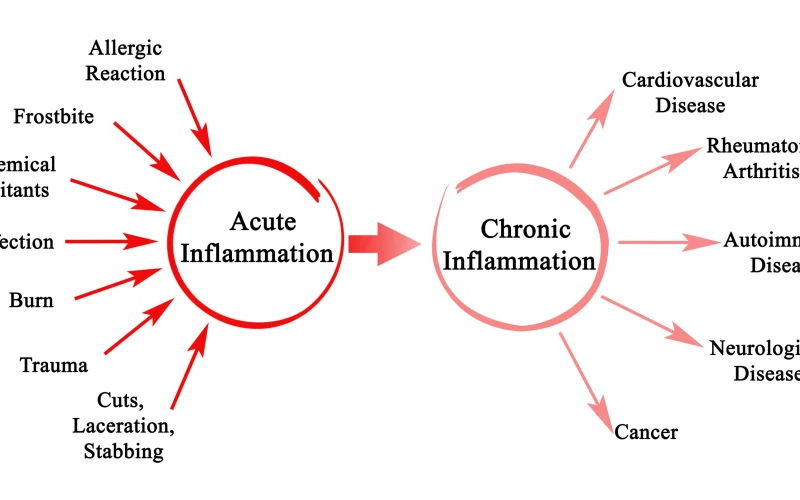Introduction
Inflammation is your body’s natural defense against injury and infection. When you cut yourself or catch a cold, acute inflammation kicks in—swelling, redness, and warmth help you heal. But when inflammation lingers for months or years, it becomes chronic inflammation, silently harming your tissues and raising your risk for diseases like diabetes, heart problems, and arthritis. In this article, we’ll explain what chronic inflammation is, explore its common causes and telltale symptoms, and share how to treat it through simple diet and lifestyle changes as well as medical approaches. By understanding and tackling chronic inflammation early, you can protect your long-term health and vitality.
What Is Chronic Inflammation?
Inflammation is a normal immune response. Acute inflammation helps you recover from cuts, scrapes, and infections. Chronic inflammation, however, occurs when this response doesn’t switch off. Instead of short-lived swelling, your immune system stays active, sending white blood cells and chemicals that damage healthy cells and organs over time. Unlike acute inflammation, which you can see and feel, chronic inflammation often works quietly, producing subtle signs that many people miss until serious health issues arise.
Common Causes of Chronic Inflammation
Chronic inflammation can arise from many factors, often working together:
- Poor Diet:
- High in sugar, refined carbs, and unhealthy fats.
- Processed foods with additives and trans fats trigger immune overdrive.
- Excess Body Weight:
- Fat cells release inflammatory chemicals.
- Obesity is strongly linked to persistent low-grade inflammation.
- Chronic Stress:
- Stress hormones like cortisol can impair immune regulation.
- Ongoing stress—work, relationships, financial worries—fans inflammation.
- Lack of Exercise:
- Sedentary lifestyles lower anti-inflammatory signals.
- Regular movement helps clear inflammatory molecules.
- Environmental Toxins:
- Pollution, cigarette smoke, and chemicals in cleaning products can damage tissues and fuel inflammation.
- Infections:
- Untreated or recurring infections—viral, bacterial, or fungal—keep your immune system activated.
- Autoimmune Disorders:
- In conditions like rheumatoid arthritis or lupus, the immune system attacks healthy tissues, causing chronic inflammation.
Recognizing these causes helps you focus on the right strategies to reduce inflammation and protect your health.
Signs and Symptoms to Watch For
Chronic inflammation often hides in plain sight. Look for these common signs:
- Persistent Fatigue: Feeling tired even after a full night’s sleep.
- Frequent Infections: Colds, sinus infections, or wounds that won’t heal quickly.
- Joint & Muscle Pain: Achy joints or stiffness, sometimes accompanied by swelling.
- Gastrointestinal Upset: Bloating, diarrhea, or constipation that recurs.
- Skin Problems: Acne, eczema, or psoriasis can flare up with inflammation.
- Mood Changes: Anxiety, depression, or brain fog may stem from inflammatory chemicals.
- Unexplained Weight Changes: Both weight gain and weight loss can link to inflammation.
If you notice several of these signs for weeks or months, speak to your doctor about testing for chronic inflammation markers like C-reactive protein (CRP) or erythrocyte sedimentation rate (ESR).
Diagnosing Chronic Inflammation
Your healthcare provider may use a combination of methods:
- Medical History & Physical Exam: Discuss your symptoms, lifestyle, and family history of inflammatory diseases.
- Blood Tests: Look for elevated CRP, ESR, and specific markers like interleukin-6.
- Imaging Studies: X-rays, ultrasound, or MRI to check for joint damage or organ inflammation.
- Allergy Testing: Identify food or environmental triggers that may fuel inflammation.
- Biopsy (Rarely): A small tissue sample to rule out autoimmune or other conditions.
A clear diagnosis guides the most effective treatment plan tailored to your needs.
How to Treat Chronic Inflammation
1. Anti-Inflammatory Diet
Food is one of the strongest tools you have:
- Load Up on Fruits & Veggies: Berries, leafy greens, and cruciferous vegetables (broccoli, cauliflower) are rich in antioxidants.
- Choose Whole Grains: Brown rice, oats, and quinoa release energy slowly, avoiding blood sugar spikes.
- Eat Healthy Fats: Olive oil, avocados, nuts, and seeds provide omega-3s that reduce inflammation.
- Enjoy Fatty Fish: Salmon, mackerel, and sardines offer anti-inflammatory EPA and DHA.
- Spice It Up: Turmeric (with black pepper), ginger, and garlic have natural anti-inflammatory compounds.
- Limit Pro-Inflammatory Foods: Cut back on sugar, processed snacks, red and processed meats, and refined oils.
2. Regular Physical Activity
Exercise helps clear inflammatory chemicals:
- Aim for 30 Minutes Daily: Brisk walking, cycling, or swimming works well.
- Include Strength Training: Two days a week to build muscle, which improves insulin sensitivity.
- Try Mind-Body Practices: Yoga, tai chi, or mindful stretching reduce stress and inflammation.
3. Stress Management
Chronic stress drives inflammation—so manage it well:
- Practice Relaxation Techniques: Deep breathing, guided imagery, or progressive muscle relaxation.
- Maintain a Sleep Routine: Aim for 7–9 hours per night; poor sleep boosts inflammatory markers.
- Seek Social Support: Talk with friends or join support groups to reduce emotional burden.
- Consider Professional Help: Therapy or counseling for chronic anxiety or depression.
4. Supplements and Natural Remedies
While food is best, certain supplements can help:
- Fish Oil Capsules: High in EPA/DHA—start with 1,000 mg daily.
- Curcumin (Turmeric Extract): Look for formulations with black pepper for better absorption—500 mg twice daily.
- Vitamin D: Many people are low; 1,000–2,000 IU daily supports immune balance.
- Probiotics: A healthy gut microbiome influences whole-body inflammation.
Always discuss supplements with your healthcare provider before starting.
5. Medical Treatments
In some cases, lifestyle changes aren’t enough:
- Nonsteroidal Anti-Inflammatory Drugs (NSAIDs): Ibuprofen or naproxen relieve pain but have side effects with long-term use.
- Corticosteroids: Strong anti-inflammatory medications for severe flare-ups; used short term.
- Disease-Modifying Drugs (DMARDs): For autoimmune disease, drugs like methotrexate or biological agents (e.g., TNF inhibitors) target specific inflammatory pathways.
- Statins: Originally for cholesterol, they can lower inflammation in heart disease patients.
Work with your doctor to weigh benefits and risks of any medication.
Lifestyle Adjustments for Long-Term Health
- Quit Smoking: Tobacco is a major inflammatory trigger.
- Limit Alcohol: Excess drinking raises inflammatory markers—stick to moderate use (up to one drink a day for women, two for men).
- Maintain Healthy Weight: Every extra pound adds inflammatory chemicals—aim for a body mass index (BMI) in the normal range.
- Practice Good Dental Hygiene: Gum disease can spread inflammation to other tissues.
- Stay Hydrated: Water helps flush toxins and supports healthy cellular function.
Small, consistent changes build a strong defense against chronic inflammation.
When to Seek Professional Help
If your symptoms persist despite lifestyle efforts, consult your doctor or a specialist:
- Persistent Joint Pain or Swelling that doesn’t improve.
- Frequent Infections or slow wound healing.
- Unexplained Fatigue or Weight Loss.
- Signs of Organ Involvement: Shortness of breath, chest pain, or abdominal pain.
Early intervention can prevent complications and improve your quality of life.
Conclusion
Chronic inflammation affects your body quietly but can lead to serious health issues if left unchecked. By understanding its causes, recognizing symptoms, and using a combination of diet, exercise, stress management, and, when needed, medical treatments, you can turn down the fire within your body. Simple changes—like adding more fruits and vegetables, moving your body daily, and practicing relaxation techniques—go a long way in reducing inflammation. If over-the-counter measures aren’t enough, work with your healthcare provider to explore prescription options. With patience and persistence, you can regain control of your health, reduce chronic inflammation, and enjoy a more energetic, pain-free life.










